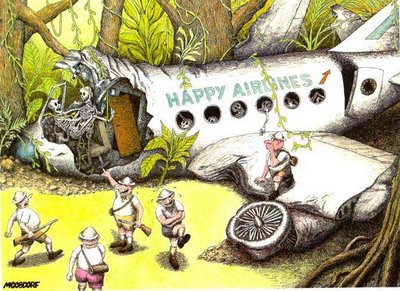
By Alex Constantine
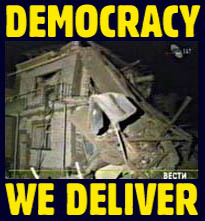 "Small arms sales recently to Albania, Bosnia and FYR of Macedonia could come back to HAUNT us sooner than we think. Secretary of State Madeleine Albright announced at a September 1998 United Nations meeting that arms exporting states 'bear some [sic] responsibility' for a trade which 'fuels conflict, fortifies extremism and destabilizes entire regions' in Africa and worldwide. ... "
"Small arms sales recently to Albania, Bosnia and FYR of Macedonia could come back to HAUNT us sooner than we think. Secretary of State Madeleine Albright announced at a September 1998 United Nations meeting that arms exporting states 'bear some [sic] responsibility' for a trade which 'fuels conflict, fortifies extremism and destabilizes entire regions' in Africa and worldwide. ... " – Anna Rich, "U.S. Exports Arms to the World"
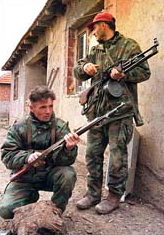 Macedonia, Romainia, Albania and Bulgaria constitute the "outer ring" of East European smuggling routes (and therefore have been beset by smuggling from former Yugoslavia – the governments of these countries acted as mediators in major transnational smuggling operations, in violation of sanctions imposed by international agreement.
Macedonia, Romainia, Albania and Bulgaria constitute the "outer ring" of East European smuggling routes (and therefore have been beset by smuggling from former Yugoslavia – the governments of these countries acted as mediators in major transnational smuggling operations, in violation of sanctions imposed by international agreement.Yuri Malinkovski received a stern slap on the wrist – three years probation in 1999 for lethal violations of the International Emergency Economic Powers and Export Administration Acts, and he was prohibited from exporting anything for a period of ten years.
At the receiving end, the Macedonian government denied involvement in black trades, but the evidence indicated that Micei Forten re-sold them to Serbia.141
Aim Skopje observed after the 1996 arrest of Malinkovski, "this is perhaps the greatest scandal the regime has been involved in." The government "has been shaken by all kinds of scandals in the course of this year, involving the very top of the administration."
An assassination plot hatched to take out Vanco Cifliganecto, a deputy of the ruling Social Democratic Alliance (SDSM, the former communist party), was aborted and exposed.
"Just after dust had settled [from a] typical mafia-like showdown and
 the cruel murder which took place close to the Macedonian assembly, a deputy ... nervously asked from the platform of that same assembly: 'Is it true that somebody is trying to liquidate me? And is my LIQUIDATION supposed to CONCEAL SOMEBODY'S SINS?'
the cruel murder which took place close to the Macedonian assembly, a deputy ... nervously asked from the platform of that same assembly: 'Is it true that somebody is trying to liquidate me? And is my LIQUIDATION supposed to CONCEAL SOMEBODY'S SINS?'"Regardless of the outcome, the question of the deputy from Radovis will be remembered as perhaps the unique parliamentary question in the world because a deputy of the ruling party asked his own government "WHY" it wanted him killed.
"The question exploded like a bomb in the midst of increasingly sharp articles about Macedonia smuggling arms at the height of the war in Bosnia and blockade of Serbia. Discontent of the public is increasing as the veil is rising which carefully concealed the truth that in the 'oasis of peace' ... certain influential politicians and personages [at the highest rungs of authority] made enormous wealth as true war profiteers and black marketeers."142
Cifliganec, wealthy manager of the Bucim copper mine, "has in fact just confirmed speculations of the Macedonian tabliods that two years ago he was threatened with assassination by certain Zoran Saklev, officer of the Army of the Republic of Macedonia (ARM) at the time. Allegedly, as an experienced intelligence officer trained in the former Yugoslav army and its intelligence service, Saklev was supposed to kill the manager of Bucim and the respectable member of the leadership of the ruling party SDSM for 20 thousand German marks."
But the "most interesting participant" in the scandal was "public prosecutor Stevan Pavlevski. He confirmed that last year he had looked into data on Zoran Saklev and established that the material gathered by the intelligence service of the Army was thin."
"According to Pavlevski, it did not contain sufficient evidence for raising criminal charges, and least of all for his arrest. Rumour continues to spread and acquire interesting proportions. Pro-regime media claim that this is a case of "'classic product of propaganda with a specific goal and function.' The goal, for Nova Makedonija daily, is Macedonian intelligence service. Why? This newspaper does not have an answer for that. It probably believes that it is clear to internal and external enemies."143
Five months before search warrants were issued at Galls & Sons in Lexington, Christopher Deliso reported on February 26, 2004:
Macedonian President Killed in Bosnia Plane Crash
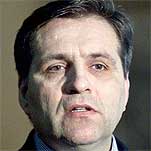 Boris Trajkovski
Boris Trajkovski"Macedonians are in a state of shock today as the first incomplete reports of the death of their president, Boris Trajkovski, start to filter back from Bosnia, where the president and 8 others died early this morning in a plane crash, in mountainous terrain ... near Croatia's southern coast." Everyone aboard – Trajkovski, six advisors, guards, A two-man crew, were presumed dead. The crash was blamed on inclement weather ... at first ...
It was a "sad irony" that "Trajkovski was on his way to an investment conference in Mostar, just as Macedonia’s EU application was about to be officially presented in Ireland [which presides on an honorary basis over the EU]."
Trajkovski was elected in 1999, "and presided over Macedonia’s most difficult period: the turbulence brought on by NATO’s Kosovo bombardment and the 2001 war, with its uncertain aftermath. Through it all, Trajkovski was firmly pro-American."144
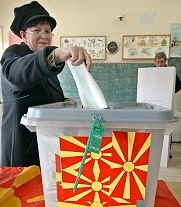 As a matter of fact, Trajkovski's rise to office was, according to Sam Vaknin, a former economic advisor to the government of Macedonia, "attributed by the opposition - and not only by the opposition - to mass electoral fraud among Albanian voters. There were hints of a collusion at the highest levels involving a web of business interests and meddling Western diplomats."
As a matter of fact, Trajkovski's rise to office was, according to Sam Vaknin, a former economic advisor to the government of Macedonia, "attributed by the opposition - and not only by the opposition - to mass electoral fraud among Albanian voters. There were hints of a collusion at the highest levels involving a web of business interests and meddling Western diplomats."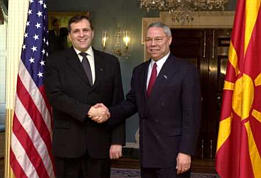
 The West's geo-political intrigues bred rot: "There isn't a single country in the Balkan - Serbia included - whose political elite, past and present, is not thoroughly criminalized. Crime, business, and politics are inextricable in this part of the world. ... The early histories of many nations – perhaps all nations – are studded with rogues, terrorists, criminals, slave traders, eccentrics, and worse. Robber barons, gunslingers, outcasts, slavers, and criminals established both the United States and Australia, for instance."
The West's geo-political intrigues bred rot: "There isn't a single country in the Balkan - Serbia included - whose political elite, past and present, is not thoroughly criminalized. Crime, business, and politics are inextricable in this part of the world. ... The early histories of many nations – perhaps all nations – are studded with rogues, terrorists, criminals, slave traders, eccentrics, and worse. Robber barons, gunslingers, outcasts, slavers, and criminals established both the United States and Australia, for instance."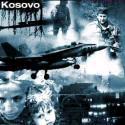 "Macedonians regard U.S. actions in the Balkans as erratic and opposed to their own interests. [The] U.S. first said ... it would act in a manner fair to all sides. But the U.S. breached both of these positions when it intervened militarily in Kosovo. It did so not only by favoring one side--the Albanian Kosovo Liberation Army--but by arming and training it and supplying it with military intelligence. Macedonians are bitter at NATO for allowing the KLA to operate with impunity both in Kosovo and in Macedonia, even though it had stated that its goal was to disarm the KLA once UN forces were in place. Many Macedonians, therefore, suspect that the U.S. is assisting the terrorists in order to justify stationing significant forces in the country and making Macedonia into a protectorate, as has already happened in Kosovo and Bosnia.... Serbia has sold its soul to the 'liberal-capitalistic' dream of Western-style prosperity and 'civil society' (which is, in reality, uncivil and asocial). It is now a de facto economic protectorate of the United States and its long arms, the IMF and the World Bank. Militarily, it is completely defanged. And its corrupt politicians and businessmen are addicted to Western payouts and handouts. The population is fatigued, bombed into submission."
"Macedonians regard U.S. actions in the Balkans as erratic and opposed to their own interests. [The] U.S. first said ... it would act in a manner fair to all sides. But the U.S. breached both of these positions when it intervened militarily in Kosovo. It did so not only by favoring one side--the Albanian Kosovo Liberation Army--but by arming and training it and supplying it with military intelligence. Macedonians are bitter at NATO for allowing the KLA to operate with impunity both in Kosovo and in Macedonia, even though it had stated that its goal was to disarm the KLA once UN forces were in place. Many Macedonians, therefore, suspect that the U.S. is assisting the terrorists in order to justify stationing significant forces in the country and making Macedonia into a protectorate, as has already happened in Kosovo and Bosnia.... Serbia has sold its soul to the 'liberal-capitalistic' dream of Western-style prosperity and 'civil society' (which is, in reality, uncivil and asocial). It is now a de facto economic protectorate of the United States and its long arms, the IMF and the World Bank. Militarily, it is completely defanged. And its corrupt politicians and businessmen are addicted to Western payouts and handouts. The population is fatigued, bombed into submission."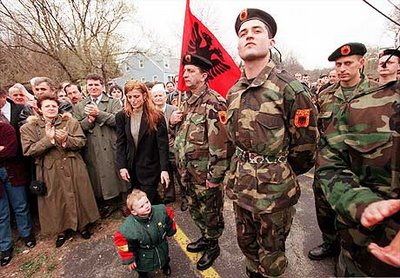 THE KLA
THE KLA"The Washington Consensus," he said, "has proved to be an unmitigated failure in dozens of countries throughout the world."145
Croatian President Stipe Mesic offered that the Macedonian leader's death would have "political consequences" in the Balkans: "This afternoon I was supposed to meet Boris at the conference on investment in Bosnia. Together with him and the presidents of other states we worked on the program of stabilization and reconciliation in southeastern Europe."146
There was some speculation before his death, Paul Mojzes wrote in August 2001, that Trajkovski "might be assassinated by those who consider him too close to the 'international community.'"147
 The provocateuring of Ugly Americans in the Balkans, News from Russia editorialized, was the work of the CIA, and "exposed the U.S. government as an imperial state. It could turn out in the long run that another empire will find its graveyard in the Balkans if interventionist hawks prevail in Washington." 148
The provocateuring of Ugly Americans in the Balkans, News from Russia editorialized, was the work of the CIA, and "exposed the U.S. government as an imperial state. It could turn out in the long run that another empire will find its graveyard in the Balkans if interventionist hawks prevail in Washington." 148President Boris Trajkovski claimed a plot in that graveyard. There were many – including other government leaders in the Balkans – who doubted the official explanations:
"The whole amorphous affair is already taking on uniquely Balkan conspiratorial tones," Deliso reported:
PILOT ERROR?
"While a Bosnian newspaper blamed the crash on pilot error, the son of lead pilot Marko Markovski, civil aviation official Zoran Markovski rejected this possibility." [The Russian language article with Markivski's comments is here: http://dnevnik.com.mk/default.asp?pBroj=2392&stID=29949]. "Experienced Macedonian pilots surveyed by Dnevnik newspaper agreed that Markovski Sr. was 'one of the best,' a flight instructor and pilot with 30 years flying experience in both military and civilian aircraft, a man who had wide experience flying intercontinental and European routes.
"The expertise of co-pilot Branko Ivanovski, an experienced officer in the Macedonian air force, is supported by a leaked US Air Force document that I have seen. Dated April 7, 2000, the document records Ivanovski's attendance at a 5-week squadron officer course at Maxwell Air Force Base in Alabama. Signed by a USAF colonel, the document commends Ivanovski's abilities, stating that he displayed 'top analytical and decision-making skills,' and also 'excelled in extremely challenging, dynamic leadership situations.... Bosnian media who spoke with investigators claim that audio tapes record 25 minutes of recorded ground-pilot conversation – followed by a SEVEN-MINUTE SILENCE preceding the crash."
The portions of Deliso's report that suggest sabotage are excerpted here in full, followed by a report on an explosion that accounts for the seven minute radio silence immediately preceding the plane crash:
 "DID NATO KILL THE PRESIDENT?"
"DID NATO KILL THE PRESIDENT?"On Friday, February 27, the day after the crash, a Bosnian Interior Ministry official raised a provocative question:
"…at the moment when the plane hit the hill, it was 650 meters lower than the minimally allowed flight height. Also, during the fall, the plane of the Macedonian Government was only 15 air kilometers away from the airport in Mostar. That radius vector is under direct control of SFOR's navigation team."
The implications were apparent. Mladen Ivanovikj, Foreign Minister of Bosnia and Herzegovina, stated ominously on the 27th that "SFOR will be requested to provide more information." The media jumped at the chance to confirm NATO's biggest Balkan blunder.
The most controversial, and, therefore, most popular, charge is that SFOR air traffic controllers demonstrated negligence either by ignoring the incoming Macedonian plane or by allowing it to fly too low. This theory has been aired by various Bosnian Interior Ministry officials, Macedonian investigators, and the media in both countries.
Some also allege that the plane was locked into a dangerous air corridor, too close to another, safe, corridor. Mostar was a popular destination on February 26 because of the international investment conference to which President Trajkovski and other regional leaders were headed. Several of the delegations, including that of the Albanians, who shared the Macedonian's flight path turned back because of the bad weather. Is it possible that the SFOR controllers mistakenly allotted a dangerous route to the Macedonians in their haste to prepare for so many planes all arriving nearly simultaneously?
Another much less credible possibility – that the pilots couldn't communicate with the ground controllers because the latter were French and speaking in their own language – was thankfully laid to rest in Tuesday's statement from the government.
The Apparent Justification: A Late and Faulty Search
The principal evidence against SFOR, for Macedonian and Bosnian critics, is the fact that it took over 24 hours for the wreckage of the plane to be found. The plane disappeared at 8:20 AM on the 26th, and for an entire day, SFOR, citing dangerous weather conditions, didn't allow air searches. Only ground searches were conducted, but slowly and ineffectually (the area remains heavily mined from the Bosnian War). SFOR Spokesman Captain Dave Sullivan stated on Tuesday, March 2, that, "…because of the bad weather, the investigation was limited to visual searching of the area. Even infrared searching was not possible."
This explanation was attacked at once. Given that the air traffic controllers knew the plane's last coordinates, and that it should have automatically emitted an emergency radio signal upon crashing, critics argued, why did SFOR fail to locate the wreckage quickly? And why were the Bosnian search teams – the world's best at working in minefields – prevented from searching?
According to the above-mentioned Bosnian official, "…the question arises as to why SFOR, being the direct controller of the flight during the whole day and night, didn't announce the exact location of the plane crash and why the search for the missing plane took 24 hours, if they saw on the navigation system where the plane had crashed."
Zoran Markovski, himself an air traffic controller, agreed:
"…they [Mostar's SFOR controllers] can register the exact geographic position of the plane, its height and speed. Yet the plane was found 26 hours after the accident and was only 10 kilometers from the airport, and crashed during the landing phase. Why wasn't the Bosnian search team activated – the one which during the war found a crashed plane and saved the pilot in just 17 minutes?"
Rising Tensions
The mutual mistrust was compounded by unverified statements that the French air traffic controllers in question had fled Bosnia after the crash. On 1 March, Macedonian Prime Minister Branko Crvenkovski thundered, "…I don't know whether they are out of Bosnia or not but wherever they are they cannot avoid being investigated."
Two days later, SFOR spokesman Norbert Hoerpel was claiming that the French air controllers had already been interrogated by investigators. However, Bosnian State Prosecutor and chief of the investigation Vaso Marinkovic rebuked him: "… no one from our team has talked with them. I do not have information [as to] whom they have…talked [to], but certainly they have had no talks with us."
In response, Hoerpel stated, "…I know that they [the alleged interrogators] were members of the Air Accident Investigation Committee, but I do not know their names." Simultaneously, damage control was being carried out by Bosnia's Europolice spokesman, Kirsten Haupt, who "…denied accusations that Europolice might be responsible for the disinformation…on the day of the accident."
A Conspiracy – Or Just a Bad Plane?
 A final explanation offered was that the 26-year-old Beechcraft King Air 200 suffered mechanical failure. A former foreign minister, Slobodan Casule, claimed that the windshield of the very same plane had once blown out during a flight over Romania. In fact, it is said that President Trajkovski himself once refused to take the plane, deeming it unsafe. There was also a mysterious claim of a pre-clash explosion on the plane.
A final explanation offered was that the 26-year-old Beechcraft King Air 200 suffered mechanical failure. A former foreign minister, Slobodan Casule, claimed that the windshield of the very same plane had once blown out during a flight over Romania. In fact, it is said that President Trajkovski himself once refused to take the plane, deeming it unsafe. There was also a mysterious claim of a pre-clash explosion on the plane.Slobodan Casule, a former Foreign Minister, claimed that the crashed plane had almost endangered his life on one occasion. Stojan Andov of the Liberal Party is on his right.
Yet although less conspiratorial this explanation is just as politically charged as the others. Indeed, even if a Macedonian president could never hope to have a jet like the one George W. Bush enjoys, should he really be condemned to fly on a twin-engine relic? Casule claimed that "public outcry" had prevented the country from spending more money on a better plane.
No wonder then that the government has diverted public attention by taking the offensive against SFOR. If it turns out that mechanical and not human error was behind the crash, it will be hard to avoid the embarrassing conclusion that, all heartfelt expressions of sympathy aside, the country actually cares very little for the well-being of its leaders. And this is where we leave the investigation behind and enter into the still more shadowy realm of symbol.

Suspected blast occurs aboard crashed Macedonian presidential plane
www.chinaview.cn 2004-02-27
SOFIA, Feb. 27 (Xinhuanet) -- A suspected blast occurred on board shortly before the crashed Macedonian presidential plane went lost from radar, a local Bulgarian radio reported Thursday.
The report quoted Sasho Yordanovski, editor-in-chief of the Macedonian magazine Forum, as saying that there have been two versions of the cause of the tragic incident, which claimed the lives of the Macedonian president and other eight people.
One version attributed the accident to bad weather conditions in the area early Thursday and the other suggested a technical failure of the 25-year-old aircraft.
Both Bosnian and Macedonian police have reached the site of theplane crash in the Bosnian mountains, and are working to identify cause.
Trajkovski, 47, died when his plane crashed in the mountainous terrain in the south of Bosnia and Herzegovina in thick fog, along with eight others aboard.
Besides the president, the victims include his councilors DimkaIlkova-Boshkovic, Risto Blazhevski and Anita Lozanovska, foreign affairs official Mile Krastevski, two bodyguards Atse Bozhinovski and Borsi Velinov, and two pilots Marko Markovski and Branko Ivanovski.
The Macedonian president had been on his way to a conference in the Bosnian town of Mostar.149
[To be continued ... ]
NEXT ...

THE BLOOD MONEY TRAIL TO THE UK ... BACK TO THE BEATING HEART OF THE ARMS SMUGGLING CONSPIRACY – IN AMERICA – AND KEY MYSTERIES EXPLAINED!
NOTES
141.) CSD Report, "The Outer Ring: The Role of Macedonia, Albania, Romania and Bulgaria," http://www.csd.bg/publications/book10/1.3.pdf
142.) AIM Skopje, "Scandal with Weapons," 16 December, 1997.
http://www.aimpress.ch/dyn/trae/archive/data/199712/71226-018-trae-sko.htm
143.) Ibid.
144.) Christopher Deliso, "Macedonian President Killed in Bosnia Plane Crash," balkanalysis.com, February 26, 2004.
http://www.antiwar.com/deliso/?articleid=2043
145.) Mickey Bozinovich, "Interview with Serbianna," Buzzle.com.
http://www.buzzle.com/editorials/5-16-2004-54203.asp
146.) Paul Moizes, "Into the inferno? - present-day Macedonia," Christian Century, August 29, 2001.
http://www.findarticles.com/p/articles/mi_m1058/is_24_118/ai_78545549/pg_4
147.) Ibid.
148.) Raymond Kent, "The Balkans, Blowback and Bodybags," News from Russia, September, 9, 2003.
http://newsfromrussia.com/yougoslavia/2001/09/03/14022.html
149.) http://news.xinhuanet.com/english/2004-02/27/content_1334947.htm




